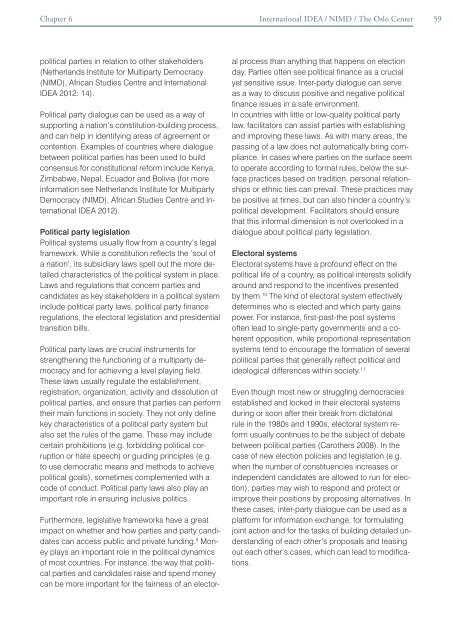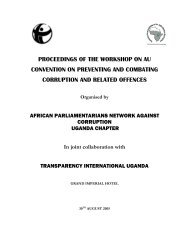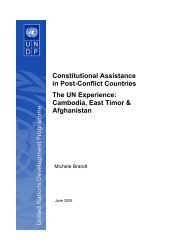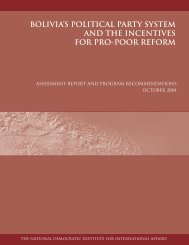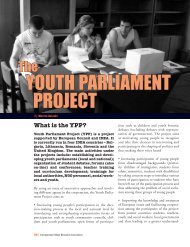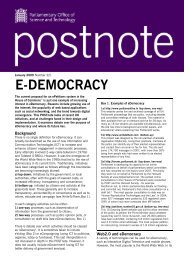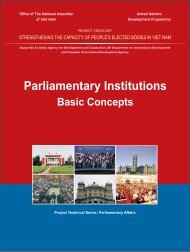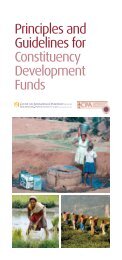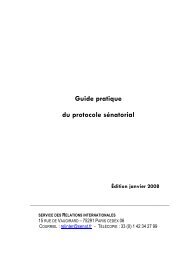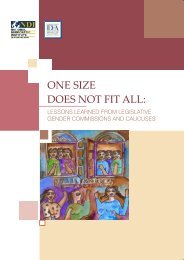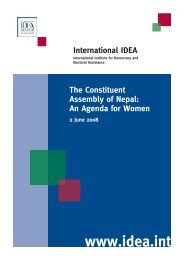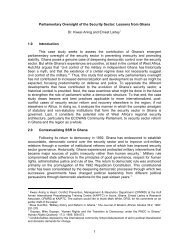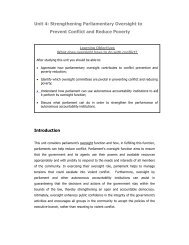Political Party Dialogue â A facilitators guide
Political Party Dialogue â A facilitators guide
Political Party Dialogue â A facilitators guide
Create successful ePaper yourself
Turn your PDF publications into a flip-book with our unique Google optimized e-Paper software.
Chapter 6International IDEA / NIMD / The Oslo Center59political parties in relation to other stakeholders(Netherlands Institute for Multiparty Democracy(NIMD), African Studies Centre and InternationalIDEA 2012: 14).<strong>Political</strong> party dialogue can be used as a way ofsupporting a nation’s constitution-building process,and can help in identifying areas of agreement orcontention. Examples of countries where dialoguebetween political parties has been used to buildconsensus for constitutional reform include Kenya,Zimbabwe, Nepal, Ecuador and Bolivia (for moreinformation see Netherlands Institute for MultipartyDemocracy (NIMD), African Studies Centre and InternationalIDEA 2012).<strong>Political</strong> party legislation<strong>Political</strong> systems usually flow from a country’s legalframework. While a constitution reflects the ‘soul ofa nation’, its subsidiary laws spell out the more detailedcharacteristics of the political system in place.Laws and regulations that concern parties andcandidates as key stakeholders in a political systeminclude political party laws, political party financeregulations, the electoral legislation and presidentialtransition bills.<strong>Political</strong> party laws are crucial instruments forstrengthening the functioning of a multiparty democracyand for achieving a level playing field.These laws usually regulate the establishment,registration, organization, activity and dissolution ofpolitical parties, and ensure that parties can performtheir main functions in society. They not only definekey characteristics of a political party system butalso set the rules of the game. These may includecertain prohibitions (e.g. forbidding political corruptionor hate speech) or guiding principles (e.g.to use democratic means and methods to achievepolitical goals), sometimes complemented with acode of conduct. <strong>Political</strong> party laws also play animportant role in ensuring inclusive politics.Furthermore, legislative frameworks have a greatimpact on whether and how parties and party candidatescan access public and private funding. 9 Moneyplays an important role in the political dynamicsof most countries. For instance, the way that politicalparties and candidates raise and spend moneycan be more important for the fairness of an electoralprocess than anything that happens on electionday. Parties often see political finance as a crucialyet sensitive issue. Inter-party dialogue can serveas a way to discuss positive and negative politicalfinance issues in a safe environment.In countries with little or low-quality political partylaw, <strong>facilitators</strong> can assist parties with establishingand improving these laws. As with many areas, thepassing of a law does not automatically bring compliance.In cases where parties on the surface seemto operate according to formal rules, below the surfacepractices based on tradition, personal relationshipsor ethnic ties can prevail. These practices maybe positive at times, but can also hinder a country’spolitical development. Facilitators should ensurethat this informal dimension is not overlooked in adialogue about political party legislation.Electoral systemsElectoral systems have a profound effect on thepolitical life of a country, as political interests solidifyaround and respond to the incentives presentedby them. 10 The kind of electoral system effectivelydetermines who is elected and which party gainspower. For instance, first-past-the post systemsoften lead to single-party governments and a coherentopposition, while proportional representationsystems tend to encourage the formation of severalpolitical parties that generally reflect political andideological differences within society. 11Even though most new or struggling democraciesestablished and locked in their electoral systemsduring or soon after their break from dictatorialrule in the 1980s and 1990s, electoral system reformusually continues to be the subject of debatebetween political parties (Carothers 2008). In thecase of new election policies and legislation (e.g.when the number of constituencies increases orindependent candidates are allowed to run for election),parties may wish to respond and protect orimprove their positions by proposing alternatives. Inthese cases, inter-party dialogue can be used as aplatform for information exchange, for formulatingjoint action and for the tasks of building detailed understandingof each other’s proposals and teasingout each other’s cases, which can lead to modifications.


